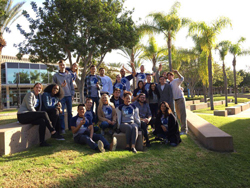The University community was introduced to the growing problem occurring in the ocean through a seminar entitled “Sea Change: Imagine a World Without Fish” last Wednesday as a part of the Global Understanding Convention. The event consisted of a film viewing followed by a presentation and discussion led by Dr. Matthew Poach, a Marine Biochemist for the National Oceanic and Atmospheric Administration (NOAA).
Ursula Howson, a professor of biology, began the program with an introduction to the film “A Sea Change.” The documentary “investigates how ocean acidification will affect future generations,” Howson said. According to the NOAA, ocean acidification is a process through which carbon dioxide is absorbed by the ocean and changes the chemistry in the water. As described by the film, ocean acidification is “the ‘flipside’ of global warming.”
The documentary featured Sven Huseby, a retired history teacher who, after reading an article about ocean acidification, became worried that his grandchildren would be affected by the changes. The film documents Huseby’s efforts to research the causes and effects of the issue, as well as how it can be fixed.
As presented to the audience, the film explains that the world’s oceans have absorbed 188 billion metric tons of carbon dioxide in the last 200 years, with 22 million tons being absorbed every day. As a result, oceans are becoming increasingly acidic. With these rapid chemical changes, oceanic species are unable to adapt to the ocean’s high levels of acidity.
The documentary also included commentary from scientists who fear a mass extinction of the coral reefs. In the film, Huseby asks, “Are we screwed?” to which oceanographers respond, “Yes, to a considerable extent.” It also mentioned that scientists recognize ocean acidification as an “irreversible experiment” that could result in mass oceanic extinction anywhere from 30 to 300 years from now if the problem continues.
In a presentation following the film, Howson introduced Poach to the audience with details of his past and present research with the NOAA. He is currently working on an ocean acidification research project at the Northeast Fisheries Science Center in Sandy Hook, NJ.
“The NOAA has been granted a large amount of money to study the effects of ocean acidification on commercial fish throughout the Northeast,” Poach said. As outlined by the NOAA, research is currently being guided by three hypotheses that address the variation of acidification in different oceanic areas, the changes in ecosystems from acidification, and how species will respond and adapt to acidification.
Poach explained that scientists are currently testing the different hypotheses with a research plan that “includes developing an ocean acidification monitoring network, assessing organism responses, predicting future responses, developing strategies for adapting to consequences and developing models synthesizing information for other scientists.”
For the audience, which consisted of individuals from different majors and backgrounds, Poach tried to keep information simple and easy to understand. The message that was stressed, however, was that the need to reduce carbon dioxide emissions is increasing every day. “In order to correct this issue and make something better, we need to reduce our levels of CO2,” he commented. “It all comes down to our emissions of CO2.”
Tony MacDonald, Esquire of the University’s Urban Coast Institute, who planned and attended the event, agreed with Poach on the importance of creating awareness of the issue. “Conducting research on ocean acidification is an effective message to the need to reduce CO2 levels,” he said.
Poach explained that global warming and the growing changes on Earth are undoubtedly supported by the research of expert scientists.
“We have a historical record of causing change that has led to negative impacts,” Poach said. “We know the problem is going to continue so now we need to find a way to change.”


